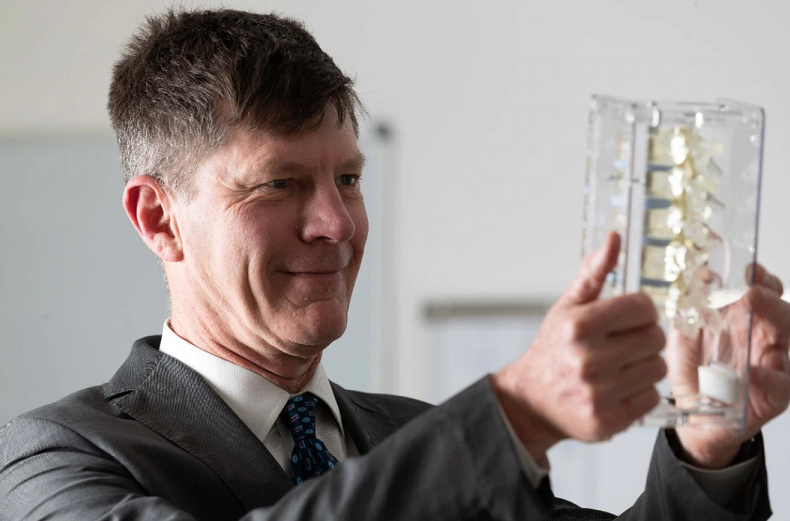
Nov 2, 2020
Good pain arrives, raises the alarm, then quickly leaves. Bad pain stays. No-one is sure why. People with chronic pain often hear it’s all in the mind. The truth is, it’s in the brain and the spine, and Professors Greg Neely and Paul Glare are working to fix it.
The University’s Pain Management Research Institute (PMRI) is a multidisciplinary unit reflecting the fact that pain itself can be discussed in medical, psychological, even philosophical terms. Professor Paul Glare (MBBS ’81, MM(ClinEpid) ’05) is the Director of the PMRI and Head of the Discipline of Pain Medicine in the Sydney Medical School, and he has a particular interest in giving people with chronic pain the tools they need to function without using opioids.
“Opioids are good for acute pain. With chronic pain they only work short to medium term,” he says. “But after about six months, you become tolerant and have to take bigger doses. Then there’s the growing risk of accidental overdose, even accidental death.”
For many people though, opioids seem like the only way to numb the pain that constantly attacks them. But do they in fact, numb the pain?
“Most people who come off the long term use of opioids realise that the drugs weren’t doing that much,” says Glare. “The drugs had already stopped working, so the pain without them is often no worse. In fact, the drugs were just messing with their heads. Still it’s a huge psychological step to let the drugs go.”
Gently spoken and with a great sense of compassion for the people he works to help, Glare started his career in palliative care which took him into the area of cancer pain, then pain more generally. Because it’s difficult to tell people battling chronic pain that there is no satisfactory pharmaceutical answer at this time, the PMRI has a large and active pain education unit.
The Unit offers a Masters of Medicine Pain Management that is also conferred as a Masters of Science for non-medical graduates. It also runs cognitive behavioural therapy classes teaching strategies for rising above the pain.
“The classes are challenging,” says Glare. “But many people who learn the self-management techniques can reduce or even stop their opioid use. It’s about them not being afraid of their pain anymore.”
It’s the nature of chronic pain that the injury it’s warning you about, sometimes very loudly, isn’t actually there. This can be seen in a person’s posture as they sit and walk in a way that protects that non-injury. By gently confronting the pain, the person can eventually reclaim their normal posture and walk more confidently. Through that, they feel stronger within themselves and more in control of their pain.
The PMRI is now looking at digital support resources for people dealing with pain, “We’re developing an SMS based text messaging service and a more sophisticated chat-bot tool, to help people get over the hump of opioid tapering,” says Glare. “It’s new in the pain world.”
AN END TO PAIN
To find out more or to help research into understanding pain please Shaan at the Pain Foundation on +61 401 140 921 or email info@painfoundation.org.au.
Written by George Dodd. Illustrated by Oslo Davis. Photography by Stefanie Zingsheim and Louise M Cooper.